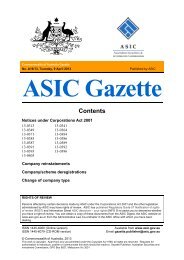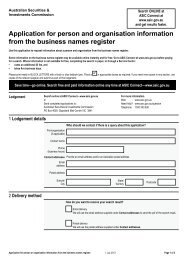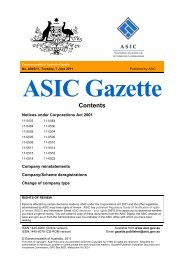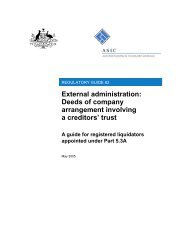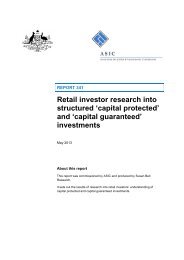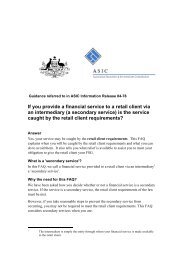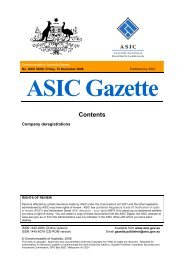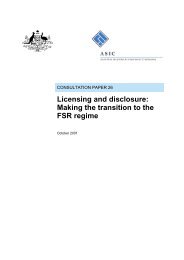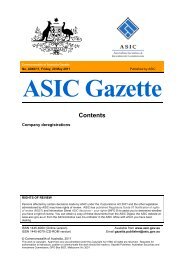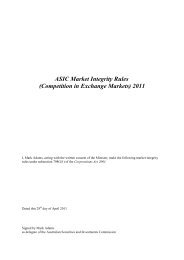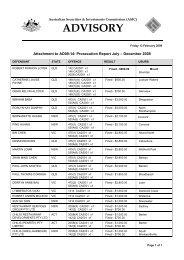Authorisation of general insurance arrangers - Australian Securities ...
Authorisation of general insurance arrangers - Australian Securities ...
Authorisation of general insurance arrangers - Australian Securities ...
You also want an ePaper? Increase the reach of your titles
YUMPU automatically turns print PDFs into web optimized ePapers that Google loves.
CONSULTATION PAPER 68<br />
<strong>Authorisation</strong> <strong>of</strong> <strong>general</strong><br />
<strong>insurance</strong> <strong>arrangers</strong><br />
August 2005
AUTHORISATION OF GENERAL INSURANCE ARRANGERS<br />
What this paper is about<br />
Guide to reading this paper<br />
Your feedback is invited<br />
1 This consultation paper sets out our proposals for relief from<br />
requirements under the Corporations Act 2001 (Corporations Act) for<br />
appointing authorised representatives where:<br />
(a) a person arranges for the issue <strong>of</strong> <strong>general</strong> <strong>insurance</strong> products <strong>of</strong> an<br />
<strong>Australian</strong> <strong>general</strong> insurer (<strong>general</strong> insurer); and<br />
(b) the insurer accepts responsibility for the conduct <strong>of</strong> that person.<br />
Note: For a description <strong>of</strong> current authorisation requirements, see Section 5 <strong>of</strong> this<br />
paper. For definitions <strong>of</strong> the terms we regularly use in this paper, see ‘Key terms’.<br />
2 This consultation paper has been developed as part <strong>of</strong> the refinement<br />
proposals set out in the <strong>Australian</strong> Government’s proposals paper<br />
Refinements to Financial Services Regulation (May 2005). The<br />
refinement proposals respond to concerns raised by the community about<br />
the practical operation <strong>of</strong> the changes brought about by the Financial<br />
Services Reform Act 2001 (FSR Act).<br />
3 In its proposals paper, the Government says that ASIC will provide<br />
guidance and/or relief from the authorisation requirements to promote<br />
wide access to <strong>general</strong> <strong>insurance</strong> products issued by an <strong>Australian</strong><br />
<strong>general</strong> insurer: see Refinement Proposal 12.2. It suggests proposed<br />
guidance and/or relief based on the relief ASIC provides to <strong>arrangers</strong> <strong>of</strong><br />
basic deposit products that act on behalf <strong>of</strong> an <strong>Australian</strong> deposit-taking<br />
institution (ADI): see Class Order [CO 04/909] Agency banking.<br />
Note: For a full extract <strong>of</strong> Refinement Proposal 12.2, see Section 5 <strong>of</strong> this paper.<br />
4 Sections 1 to 4 <strong>of</strong> this paper set out and discuss our proposed relief.<br />
We also ask questions seeking your feedback.<br />
5 Section 5 provides background information to our proposed relief<br />
including the full extract <strong>of</strong> Refinement Proposal 12.2. If you are less<br />
familiar with the context <strong>of</strong> our proposed relief, we suggest you begin<br />
with this section.<br />
6 In this paper, we refer to other ASIC publications such as class orders<br />
(CO) and frequently asked questions (QFS). You can find these publications<br />
at www.asic.gov.au or contact ASIC Infoline on 1300 300 630.<br />
7 We invite you to comment on our proposals and the questions for<br />
consideration in this consultation paper. We would also like to receive any<br />
qualitative or quantitative information to support your comments or<br />
arguments. All submissions will be treated as public documents unless you<br />
specifically request that we treat the whole or part <strong>of</strong> your submission as<br />
© <strong>Australian</strong> <strong>Securities</strong> and Investments Commission August 2005<br />
Page 2
AUTHORISATION OF GENERAL INSURANCE ARRANGERS<br />
confidential. Following the comment period, we aim to publish our final<br />
position and any necessary accompanying relief by October 2005.<br />
Your comments<br />
Comments are due by 2 September 2005 and should be sent<br />
to:<br />
Liz Roberts<br />
<strong>Australian</strong> <strong>Securities</strong> and Investments Commission<br />
GPO Box 9827<br />
Sydney NSW 2001<br />
fax: (02) 9911 2316<br />
email: liz.roberts@asic.gov.au<br />
You can also contact ASIC Infoline on 1300 300 630 for<br />
information and assistance.<br />
© <strong>Australian</strong> <strong>Securities</strong> and Investments Commission August 2005<br />
Page 3
AUTHORISATION OF GENERAL INSURANCE ARRANGERS<br />
Contents<br />
What this paper is about................................2<br />
Section 1: What is our proposed relief?..........5<br />
How will it apply? ............................................ 5<br />
Why are we considering relief? ........................ 6<br />
Section 2: Who is covered? ............................7<br />
Which distributors are covered?...................... 7<br />
Who cannot be engaged as a distributor?......... 7<br />
Who can engage distributors?.......................... 8<br />
Who is responsible for a distributor’s<br />
actions? ........................................................... 9<br />
Section 3: What products and services are<br />
covered?.......................................................11<br />
What financial products are covered?............. 11<br />
What financial services are covered? ..............12<br />
Section 4: What other obligations apply?..... 14<br />
What record keeping requirements apply? .....14<br />
What disclosure requirements apply?.............14<br />
Section 5: What is the background to our<br />
proposed relief? .......................................... 16<br />
How are <strong>general</strong> <strong>insurance</strong> products<br />
distributed? ....................................................16<br />
When must distributors be appointed as<br />
authorised representatives? ........................... 17<br />
What obligations apply?..................................19<br />
What is the Government’s Refinement<br />
Proposal 12.2?.................................................19<br />
What relief applies for banking agents? ......... 20<br />
Key terms .................................................... 21<br />
© <strong>Australian</strong> <strong>Securities</strong> and Investments Commission August 2005<br />
Page 4
AUTHORISATION OF GENERAL INSURANCE ARRANGERS<br />
Section 1: What is our proposed relief?<br />
1.1 In this section, we set out in full our proposed relief. Sections 2 to 4<br />
look at different aspects <strong>of</strong> our proposed relief in more detail, with<br />
accompanying explanation and related questions seeking feedback.<br />
1.2 We propose to provide class order relief so that, in certain<br />
circumstances, distributors <strong>of</strong> a <strong>general</strong> insurer can arrange for the issue<br />
<strong>of</strong> <strong>general</strong> <strong>insurance</strong> products without the need to be formally appointed<br />
as authorised representatives under the Corporations Act.<br />
Note: We use the term ‘distributor’ to describe a broad range <strong>of</strong> people who are involved<br />
in the distribution <strong>of</strong> <strong>general</strong> <strong>insurance</strong> products. This term includes those that may be<br />
dealing in <strong>general</strong> <strong>insurance</strong> products (such as arranging for issue). It does not include<br />
those that provide financial product advice on <strong>general</strong> <strong>insurance</strong> products. For a more<br />
detailed description <strong>of</strong> what we call ‘distributors’, see Section 5.<br />
How will it apply?<br />
1.3 Our proposed relief will apply where:<br />
(a) a <strong>general</strong> insurer is responsible and accountable for the conduct <strong>of</strong><br />
the distributor;<br />
(b) the distributor is engaged, in writing, by either:<br />
(i) the <strong>general</strong> insurer; or<br />
(ii) a licensee who the <strong>general</strong> insurer has authorised, in writing, to<br />
engage distributors to act on the insurer’s behalf;<br />
(c) the distributor is not:<br />
(i) a licensee;<br />
(ii) an authorised representative, employee or director <strong>of</strong> a<br />
licensee; or<br />
(iii) a disqualified person.<br />
(d) the distributor is authorised to provide financial services consisting<br />
only <strong>of</strong> arranging to issue <strong>general</strong> <strong>insurance</strong> products on behalf <strong>of</strong><br />
the insurer;<br />
(e) those financial services only relate to <strong>general</strong> <strong>insurance</strong> products as<br />
defined in the Corporations Act that are:<br />
(i) motor vehicle <strong>insurance</strong> products;<br />
(ii) home building <strong>insurance</strong> products;<br />
(iii) home contents <strong>insurance</strong> products;<br />
(iv) consumer credit <strong>insurance</strong> products (other than where the<br />
product includes a life risk <strong>insurance</strong> product);<br />
(v) travel <strong>insurance</strong> products; or<br />
(vi) personal and domestic property <strong>insurance</strong> products;<br />
© <strong>Australian</strong> <strong>Securities</strong> and Investments Commission August 2005<br />
Page 5
AUTHORISATION OF GENERAL INSURANCE ARRANGERS<br />
(f) the <strong>general</strong> insurer takes reasonable steps to ensure that it establishes<br />
and maintains a publicly available register containing details <strong>of</strong> all<br />
distributors who have been engaged to act on its behalf; and<br />
(g) the <strong>general</strong> insurer takes reasonable steps to ensure that, before the<br />
distributor provides financial services to a client:<br />
(i) the distributor specifically draws to the client’s attention the<br />
availability <strong>of</strong> the insurer’s dispute resolution system and how<br />
that system may be accessed; and<br />
(ii) if the client does not receive a Financial Services Guide (FSG)<br />
prepared by the insurer, the client is given information, in<br />
writing, about:<br />
(A) the capacity in which the distributor is acting; and<br />
(B) the remuneration received, or to be received, by the<br />
distributor and how it is calculated.<br />
Why are we considering relief?<br />
1.4 Our proposed relief is intended to:<br />
(a) remove uncertainty about when the authorisation requirements for<br />
certain representatives apply to distributors <strong>of</strong> <strong>general</strong> <strong>insurance</strong><br />
products;<br />
(b) remove the administrative burden on <strong>general</strong> insurers to authorise<br />
certain representatives that undertake a limited dealing function;<br />
(c) retain consumer protection for consumers when dealing with<br />
distributors <strong>of</strong> <strong>general</strong> <strong>insurance</strong> products as though the distributor<br />
was an authorised representative <strong>of</strong> the <strong>general</strong> insurer; and<br />
(d) promote wide access to <strong>general</strong> <strong>insurance</strong> products for retail clients<br />
as intended in the Government’s Refinement Proposal 12.2.<br />
© <strong>Australian</strong> <strong>Securities</strong> and Investments Commission August 2005<br />
Page 6
AUTHORISATION OF GENERAL INSURANCE ARRANGERS<br />
Section 2: Who is covered?<br />
Which distributors are covered?<br />
2.1 Our proposed relief will only apply to certain dealing activities <strong>of</strong><br />
distributors where a <strong>general</strong> insurer is responsible for those activities.<br />
Note: For a discussion <strong>of</strong> what financial products and services our proposed relief will<br />
apply to, see Section 4.<br />
2.2 Our proposed approach is intended to achieve the outcomes in<br />
paragraph 1.4 <strong>of</strong> this paper. It also:<br />
(a) ensures that our relief does not reduce consumer protection (e.g. our<br />
relief would not increase the risk that, in the event <strong>of</strong> negligence by<br />
the distributor, consumers are left uninsured);<br />
(b) minimises consumer confusion about who the distributor acts for<br />
and who is responsible for their conduct; and<br />
(c) is consistent with:<br />
(i) the Government’s Refinement Proposal 12.2; and<br />
(ii) our approach in Class Order [CO 04/909] Agency banking.<br />
2.3 Preliminary discussions with industry representatives before we<br />
issued this consultation paper indicated that there are varied distribution<br />
practices for <strong>general</strong> <strong>insurance</strong> products: see Section 5. These practices<br />
include distribution by people who do not act on behalf <strong>of</strong> a <strong>general</strong><br />
insurer (e.g. distributors who act on behalf <strong>of</strong> <strong>insurance</strong> brokers). For<br />
reasons described in paragraph 2.2, our proposed relief does not extend to<br />
the full range <strong>of</strong> distribution practices.<br />
2.4 We might consider extending our proposed relief to circumstances<br />
where a licensee other than a <strong>general</strong> insurer (such as an <strong>insurance</strong><br />
broker) takes responsibility for the conduct <strong>of</strong> a distributor. However, we<br />
need more information about these arrangements to ensure that consumer<br />
protection outcomes are not materially compromised if we give any<br />
wider relief. We ask proponents <strong>of</strong> wider relief to give brief, but<br />
complete, answers to the questions at the end <strong>of</strong> this section.<br />
Who cannot be engaged as a distributor?<br />
2.5 We propose that a person will be unable to be a distributor for the<br />
purposes <strong>of</strong> our proposed relief if the person is:<br />
(a) a licensee;<br />
(b) an authorised representative <strong>of</strong> a licensee;<br />
(c) an employee or director <strong>of</strong> a licensee; or<br />
(d) a disqualified person.<br />
Note: To determine whether a person is a disqualified person, search the relevant ASIC<br />
register at www.asic.gov.au.<br />
© <strong>Australian</strong> <strong>Securities</strong> and Investments Commission August 2005<br />
Page 7
AUTHORISATION OF GENERAL INSURANCE ARRANGERS<br />
2.6 We do not propose to extend our relief to cover licensees or their<br />
representatives. These people will either already be authorised to provide<br />
financial services for <strong>general</strong> <strong>insurance</strong> products and therefore do not<br />
require relief, or are able to vary their licence or authorisations to cover<br />
this financial service.<br />
2.7 If a distributor becomes a disqualified person after they have been<br />
engaged, we would expect the distributor’s engagement to be terminated<br />
as soon as the licensee or <strong>general</strong> insurer who engaged that distributor<br />
becomes aware that the distributor has become a disqualified person.<br />
Who can engage distributors?<br />
2.8 Our proposed relief will only apply where the distributor is engaged,<br />
in writing, by either:<br />
(a) a <strong>general</strong> insurer; or<br />
(b) a licensee who a <strong>general</strong> insurer has authorised, in writing, to<br />
engage distributors on the insurer’s behalf.<br />
2.9 We propose that, where an insurer authorises another licensee (such<br />
as an <strong>insurance</strong> broker) to engage a distributor on its behalf, the authority<br />
may be either for a specified individual or class <strong>of</strong> individuals (the<br />
membership <strong>of</strong> which may change from time to time). We understand<br />
that under some ‘binder’ arrangements, <strong>general</strong> insurers may already<br />
provide or may be prepared to provide an authority to the <strong>insurance</strong><br />
broker as contemplated under our proposed relief.<br />
2.10 We do not propose to extend relief to allow distributors to be<br />
engaged by:<br />
(a) other licensees (i.e. licensees who are not authorised to engage<br />
distributors to act on behalf <strong>of</strong> a <strong>general</strong> insurer);<br />
(b) authorised representatives <strong>of</strong> the <strong>general</strong> insurer or other licensees<br />
appointed to engaged distributors on insurer’s behalf; or<br />
(c) other distributors (i.e. one distributor would not be able to ‘subauthorise’<br />
a second distributor)..<br />
We understand sub-authorisation may occur. We seek your feedback on<br />
this issue, particularly on how any such extension <strong>of</strong> our relief would be<br />
achieved without diminishing consumer protection outcomes, such as<br />
ensuring adequate supervision <strong>of</strong> the conduct <strong>of</strong> any sub-authorised<br />
distributors.<br />
© <strong>Australian</strong> <strong>Securities</strong> and Investments Commission August 2005<br />
Page 8
AUTHORISATION OF GENERAL INSURANCE ARRANGERS<br />
Who is responsible for a distributor’s actions?<br />
2.11 Under our proposed relief, a <strong>general</strong> insurer will be fully<br />
responsible for the conduct <strong>of</strong> all distributors that are engaged to act on<br />
its behalf.<br />
2.12 As part <strong>of</strong> our relief, we propose that the <strong>general</strong> insurer must take<br />
reasonable steps to ensure that the distributor meets, and will continue to<br />
meet, all relevant regulatory requirements for the financial services it<br />
provides.<br />
2.13 If a distributor has been engaged by another licensee on the <strong>general</strong><br />
insurer’s behalf, we think that it is still appropriate to impose<br />
responsibility for the distributor’s actions on the <strong>general</strong> insurer. This is<br />
because, in these circumstances, the distributor will still be a<br />
representative <strong>of</strong> the <strong>general</strong> insurer, even though the licensee has<br />
engaged the distributor on the insurer’s behalf.<br />
2.14 If a person has been engaged as a distributor by or on behalf <strong>of</strong><br />
more than one insurer, the insurers will be subject to the same rules for<br />
joint and several liability as currently apply to the representatives <strong>of</strong><br />
licensees: see s917C.<br />
Note: We do not propose to require insurers to consent before a distributor they have<br />
engaged can act as a distributor for other insurers.<br />
2.15 The <strong>general</strong> insurer’s liability for the actions <strong>of</strong> a distributor will<br />
extend to liability for the provision <strong>of</strong> financial services within the<br />
distributor’s actual or apparent authority and will not be limited only to<br />
the distributor’s actions in arranging to issue the insurer’s <strong>general</strong><br />
<strong>insurance</strong> products. For example, if the distributor provided inappropriate<br />
financial product advice.<br />
2.16 We have adopted this approach because it will provide certainty about<br />
who is responsible for a distributor’s actions and ensure that relief does not<br />
reduce consumer protection. We also note that this requirement is consistent<br />
with Class Order [CO 04/909] Agency banking.<br />
Your feedback: Section 2<br />
Please feel free to combine your answers to these questions, or refer to other<br />
answers you have provided.<br />
Q2.1 Do you agree with the proposals in this section? If not, why?<br />
Q2.2 Do you consider any aspects <strong>of</strong> our proposals are unnecessary or<br />
inappropriate? If so, why?<br />
Q2.3 Do you foresee any practical difficulties for <strong>general</strong> insurers, other<br />
licensees (such as <strong>insurance</strong> brokers) or distributors in complying with<br />
© <strong>Australian</strong> <strong>Securities</strong> and Investments Commission August 2005<br />
Page 9
AUTHORISATION OF GENERAL INSURANCE ARRANGERS<br />
our proposals? If so, how do you propose these difficulties be<br />
addressed?<br />
Q2.4 Should our relief extend to other people (e.g. other licensees or<br />
authorised representatives) who engage distributors (such as<br />
distributors that act only on behalf <strong>of</strong> an <strong>insurance</strong> broker)? If so, who<br />
should our relief extend to and why? In what circumstances do you<br />
propose these other people should be able to engage distributors?<br />
Who do you propose would be responsible for the actions <strong>of</strong><br />
distributors in these circumstances?<br />
In answering this question, please explain the relevant distribution<br />
practices (particularly if our assumptions in Section 5 are incorrect). In<br />
what way would consumer protections not be materially affected by<br />
extending our proposed relief (e.g. is responsibility by an <strong>insurance</strong><br />
broker similar to responsibility by a <strong>general</strong> insurer)?<br />
Q2.5 Should any other class <strong>of</strong> persons be excluded from being distributors<br />
for the purposes <strong>of</strong> our relief? If so, why? How do you propose the<br />
class <strong>of</strong> persons be defined?<br />
Q2.6 Should persons who are banned or disqualified under state or federal<br />
legislation other than the Corporations Act be excluded from being<br />
distributors for the purposes <strong>of</strong> our relief? If so, why? How do you<br />
propose the class <strong>of</strong> persons be defined?<br />
© <strong>Australian</strong> <strong>Securities</strong> and Investments Commission August 2005<br />
Page 10
AUTHORISATION OF GENERAL INSURANCE ARRANGERS<br />
Section 3: What products and services are<br />
covered?<br />
What financial products are covered?<br />
3.1 Our proposed relief is limited to the following commonly acquired<br />
<strong>general</strong> <strong>insurance</strong> products:<br />
(a) motor vehicle <strong>insurance</strong> products (as defined in reg 7.1.11);<br />
(b) home building <strong>insurance</strong> products (as defined in reg 7.1.12);<br />
(c) home contents <strong>insurance</strong> products (as defined in reg 7.1.13);<br />
(d) consumer credit <strong>insurance</strong> products (as defined in reg 7.1.15),<br />
provided it is not a bundled product containing a life risk <strong>insurance</strong><br />
product (as defined in s761A);<br />
(e) travel <strong>insurance</strong> products (as defined in reg 7.1.16); and<br />
(f) personal and domestic property <strong>insurance</strong> products (as defined in<br />
reg 7.1.17).<br />
3.2 We have adopted this approach because these <strong>general</strong> <strong>insurance</strong><br />
products:<br />
(a) are relatively well understood (although they may include varying<br />
degrees <strong>of</strong> complexity); and<br />
(b) are subject to standard terms and conditions except for previously<br />
disclosed variations (see s35 <strong>of</strong> the Insurance Contracts Act 1984).<br />
3.3 We have not included personal sickness and accident <strong>insurance</strong><br />
products in our proposed relief because we think these products are less<br />
well understood and may be more complex. This means that the choices a<br />
retail client makes may have an increased potential to impact<br />
significantly on the client’s financial situation. Our proposed relief would<br />
extend to a travel <strong>insurance</strong> product where the product covers losses that<br />
arise due to sickness or accident while travelling, and to a consumer<br />
credit <strong>insurance</strong> product where the product covers consumer credit<br />
liabilities that cannot be paid due to sickness or accident.<br />
3.4 Likewise, we do not propose our relief should extend to bundled <strong>general</strong><br />
<strong>insurance</strong> products that contain a life risk <strong>insurance</strong> component (i.e. where a<br />
life insurer underwrites part <strong>of</strong> the cover). For example, our proposed relief<br />
will not cover a consumer credit <strong>insurance</strong> contract that has components<br />
underwritten by both a <strong>general</strong> insurer and a life insurer. This will help avoid<br />
consumer confusion about who the distributor is acting for when they provide<br />
financial services and who is responsible for their conduct.<br />
3.5 Our proposed approach is consistent with our approach in Policy<br />
Statement 146 Licensing: Training <strong>of</strong> financial product advisers: see<br />
[PS 146.43] and [PS 146.64].<br />
© <strong>Australian</strong> <strong>Securities</strong> and Investments Commission August 2005<br />
Page 11
AUTHORISATION OF GENERAL INSURANCE ARRANGERS<br />
What financial services are covered?<br />
3.6 Our proposed relief would only apply where the distributor is<br />
arranging for another person to issue a <strong>general</strong> <strong>insurance</strong> product. Our<br />
proposed relief will apply to financial services provided to both<br />
wholesale clients and retail clients.<br />
Note: Our proposed relief will not remove or restrict current exclusions from the<br />
definition <strong>of</strong> a financial service under Chapter 7 <strong>of</strong> the Corporations Act. Persons who<br />
are currently able to rely on exclusions (such as the ‘clerks and cashiers’ exception<br />
under s766A(3)) will continue to be able to do so. These people will not need to be<br />
appointed as distributors for the purposes <strong>of</strong> this relief.<br />
3.7 In our view, ‘arranging’ does not include:<br />
(a) dealing in a financial product as agent (e.g. where the distributor has<br />
power to bind the person they are acting on behalf <strong>of</strong>); or<br />
(b) providing financial product advice.<br />
Note: See QFS 125 What is our approach to ‘arranging’?<br />
3.8 Our proposed relief will not extend to financial services other than<br />
arranging for the issue <strong>of</strong> <strong>general</strong> <strong>insurance</strong> products. For example, our<br />
relief would not apply to a person who:<br />
(a) arranges for another person to apply for, acquire, vary or dispose <strong>of</strong><br />
a <strong>general</strong> <strong>insurance</strong> product;<br />
(b) issues, applies for, acquires, varies or disposes <strong>of</strong> a financial product<br />
(where as principal or agent); or<br />
(c) provides financial product advice.<br />
3.9 Our proposed approach is consistent with Class Order [CO 04/909]<br />
Agency banking and ensures that our relief does not reduce consumer<br />
protection. Under our proposed relief, financial services, other than<br />
arranging to issue, would still need to be provided by licensees or their<br />
authorised representatives.<br />
3.10 Preliminary discussions with industry representatives before we<br />
issued this consultation paper indicated that there is some technical<br />
uncertainty about what conduct is being undertaken by some distributors.<br />
Note: For example, there might be some uncertainty about when a distributor is<br />
arranging for another person to issue a product and when a distributor is arranging for<br />
another person as the agent for the product issuer.<br />
3.11 The conduct <strong>of</strong> distributors may also not be limited to ‘issuing’<br />
activity, but include acquiring, varying, disposing or other dealing<br />
activities. Against this background, we understand that some industry<br />
representatives believe our proposed relief should apply to a wider scope<br />
<strong>of</strong> dealing activity <strong>of</strong> distributors.<br />
3.12 We might consider extending our proposed relief. However, we<br />
need more information about any extension <strong>of</strong> relief to these activities to<br />
© <strong>Australian</strong> <strong>Securities</strong> and Investments Commission August 2005<br />
Page 12
AUTHORISATION OF GENERAL INSURANCE ARRANGERS<br />
ensure that consumer protection outcomes are not materially<br />
compromised (including that there be adequate supervision and<br />
competent individuals). We ask proponents <strong>of</strong> this wider relief to give<br />
brief, but complete answers, to the questions at the end <strong>of</strong> this section.<br />
Your feedback: Section 3<br />
Please feel free to combine your answers to these questions, or refer to other<br />
answers you have provided.<br />
Q3.1 Do you agree with the proposals in this section If not, why?<br />
Q3.2 Do you consider any aspects <strong>of</strong> our proposals are unnecessary or<br />
inappropriate? If so, why?<br />
Q3.3 Do you foresee any practical difficulties for <strong>general</strong> insurers, other<br />
licensees or distributors as a result <strong>of</strong> our proposed relief only<br />
applying to certain financial product and services? If so, how do you<br />
propose these difficulties be addressed?<br />
Q3.4 Are there any other <strong>general</strong> <strong>insurance</strong> products that should be<br />
covered by our relief? If so, which products and why?<br />
Q3.5 Are there <strong>general</strong> <strong>insurance</strong> products that should not be covered by<br />
our relief? If so, which products and why?<br />
Q3.6 Are there any other dealing activities that should be covered by our<br />
relief? If so, which services and why? For example, should our relief<br />
cover situations where a distributor applies for, acquires, varies or<br />
disposes <strong>of</strong> a financial product on behalf <strong>of</strong> another person?<br />
In answering this question, please explain the relevant distribution<br />
practices (particularly if our assumptions in Section 5 are incorrect). In<br />
what way would consumer protections not be materially affected by<br />
extending our proposed relief (e.g. do different dealing activities<br />
require different levels <strong>of</strong> competency and/or supervision that suggest<br />
limiting relief to only arranging)?<br />
© <strong>Australian</strong> <strong>Securities</strong> and Investments Commission August 2005<br />
Page 13
AUTHORISATION OF GENERAL INSURANCE ARRANGERS<br />
Section 4: What other obligations apply?<br />
What record keeping requirements apply?<br />
4.1 Under our proposed relief, a <strong>general</strong> insurer must take reasonable<br />
steps to establish and maintain a register <strong>of</strong> all distributors who have<br />
been engaged to act on its behalf. This obligation applies to both:<br />
(a) distributors engaged by the <strong>general</strong> insurer itself; and<br />
(b) distributors engaged by a licensee to act on behalf <strong>of</strong> the <strong>general</strong><br />
insurer.<br />
4.2 We propose that the register must record the following information<br />
for each distributor (or former distributor):<br />
(a) the distributor’s name and business address;<br />
(b) the types <strong>of</strong> <strong>general</strong> <strong>insurance</strong> products for which the distributor has<br />
been engaged to provide financial services;<br />
(c) the date the distributor was engaged; and<br />
(d) the date the distributor’s engagement was terminated.<br />
4.3 If a distributor has been appointed by a licensee to act on the <strong>general</strong><br />
insurer’s behalf, we would expect the <strong>general</strong> insurer to have<br />
arrangements in place with the licensee under which the licensee would,<br />
as soon as reasonably practicable, provide the insurer the information it<br />
needs to keep the register up-to-date.<br />
4.4 We also propose that the <strong>general</strong> insurer must:<br />
(a) retain these records for seven years from the date <strong>of</strong> termination <strong>of</strong><br />
the distributor; and<br />
(b) make the register available on request to ASIC and members <strong>of</strong> the<br />
public.<br />
4.5 We have proposed these requirements because we think that both<br />
ASIC and members <strong>of</strong> the public should be able to confirm whether a<br />
person is authorised to act as a distributor on the <strong>general</strong> insurer’s behalf.<br />
A <strong>general</strong> insurer may wish to provide such information to consumers on<br />
its website.<br />
What disclosure requirements apply?<br />
4.6 Under our proposed relief, the <strong>general</strong> insurer must take reasonable<br />
steps to ensure that, before the distributor provides financial services to a<br />
client:<br />
(a)<br />
the distributor specifically draws to the client’s attention the<br />
availability <strong>of</strong> the insurer’s dispute resolution system and how that<br />
system may be accessed; and<br />
© <strong>Australian</strong> <strong>Securities</strong> and Investments Commission August 2005<br />
Page 14
AUTHORISATION OF GENERAL INSURANCE ARRANGERS<br />
(b) if the client does not receive a Financial Services Guide (FSG)<br />
prepared by the insurer, the client is given information, in writing,<br />
about:<br />
(i) the capacity in which the distributor is acting; and<br />
(ii) the remuneration received, or to be received, by the distributor<br />
and how it is calculated.<br />
4.7 We think that a client who is provided with financial services by a<br />
distributor should receive substantially the same disclosure as they would<br />
have received if the financial services were provided directly by the<br />
<strong>general</strong> insurer.<br />
4.8 Under our proposed relief, the <strong>general</strong> insurer will be responsible<br />
for ensuring a retail client is given an FSG (if there is more than one) or<br />
Product Disclosure Statement (PDS). We would expect the <strong>general</strong><br />
insurer’s FSG (if any) to contain information about who the distributor<br />
acts for and how they are remunerated.<br />
4.9 If the insurer is not required to give the client an FSG (e.g. based on<br />
an exemption for certain product issuers under s941C(2)), we propose that<br />
the client be given information about who the distributor acts for and<br />
remuneration <strong>of</strong> the distributor. This information could be included in the<br />
PDS for the product or in a separate document.<br />
4.10 The proposed requirements ensure that a client receives similar<br />
information to the information they would have received had the<br />
distributor been appointed an authorised representative <strong>of</strong> the <strong>general</strong><br />
insurer.<br />
Your feedback: Section 4<br />
Please feel free to combine your answers to these questions, or refer to other<br />
answers you have provided.<br />
Q4.1 Do you agree with the proposals in this section? If not, why?<br />
Q4.2 Do you consider any aspects <strong>of</strong> our proposals are unnecessary or<br />
inappropriate? If so, why?<br />
Q4.3 Do you foresee any practical difficulties for insurers, other licensees or<br />
distributors in complying with our proposals? If so, how do you<br />
propose these difficulties be addressed?<br />
Q4.4 Should access to the information contained in the register be<br />
restricted in any way? If so, why?<br />
Q4.5 Is there any other information that clients who are provided with<br />
financial services by a distributor should receive? If so, what further<br />
information should be provided?<br />
© <strong>Australian</strong> <strong>Securities</strong> and Investments Commission August 2005<br />
Page 15
AUTHORISATION OF GENERAL INSURANCE ARRANGERS<br />
Section 5: What is the background to our<br />
proposed relief?<br />
How are <strong>general</strong> <strong>insurance</strong> products distributed?<br />
Distribution networks <strong>general</strong>ly<br />
5.1 General <strong>insurance</strong> products are distributed in many different ways<br />
and by many different people. General <strong>insurance</strong> distribution networks<br />
can be divided into two broad categories as shown in the examples in<br />
Diagrams 1 and 2.<br />
Diagram 1: Distribution by <strong>general</strong> insurer and its agents<br />
insurer<br />
arrangement<br />
to act for<br />
insurer<br />
agent<br />
product issued or<br />
arranged to be issued<br />
to consumer<br />
consumer<br />
Diagram 2: Distribution through <strong>insurance</strong> brokers and others who act for consumers<br />
insurer<br />
product acquired<br />
or arranged to be<br />
acquired for<br />
consumer<br />
<strong>insurance</strong><br />
broker<br />
arrangement to<br />
act for consumer<br />
consumer<br />
5.2 Combinations <strong>of</strong> these two categories also exist. For example:<br />
(a) products may be distributed through an <strong>insurance</strong> broker acting<br />
under a binder (i.e. the <strong>insurance</strong> broker will act for both the <strong>general</strong><br />
insurer and the consumer); or<br />
(b) the distribution chain may involve an individual acting as both an<br />
agent <strong>of</strong> a <strong>general</strong> insurer and an <strong>insurance</strong> broker in the one dealing<br />
transaction.<br />
© <strong>Australian</strong> <strong>Securities</strong> and Investments Commission August 2005<br />
Page 16
AUTHORISATION OF GENERAL INSURANCE ARRANGERS<br />
Other distributors<br />
5.3 In some cases, insurers, agents <strong>of</strong> <strong>general</strong> insurers and <strong>insurance</strong><br />
brokers may themselves wish to appoint other people to act on their<br />
behalf in distributing <strong>general</strong> <strong>insurance</strong> products. In these cases, the<br />
distributors may not be acting as ‘agent’ <strong>of</strong> the <strong>general</strong> insurer or<br />
<strong>insurance</strong> broker in a technical sense. These people range from travel<br />
agents and real estate agents to car dealerships and furniture removalists.<br />
Two typical scenarios are shown in Diagrams 3 and 4.<br />
Diagram 3<br />
insurer<br />
arrangement<br />
to act for<br />
insurer<br />
distributor<br />
product issued or<br />
arranged to be<br />
issued to consumer<br />
consumer<br />
Diagram 4<br />
insurer<br />
product acquired<br />
or arranged to be<br />
acquired for<br />
consumer<br />
<strong>insurance</strong><br />
broker<br />
arrangement to<br />
act for <strong>insurance</strong><br />
broker<br />
distributor<br />
arrangement<br />
to act for<br />
consumer<br />
consumer<br />
When must distributors be appointed as authorised<br />
representatives?<br />
5.4 In <strong>general</strong>, a distributor must be appointed as an authorised<br />
representative <strong>of</strong> a licensee where:<br />
(a) the distributor provides financial services;<br />
(b) those financial services are provided on behalf <strong>of</strong> the licensee; and<br />
(c) the distributor is not otherwise authorised under s911B to provide<br />
financial services on the licensee’s behalf (e.g. the distributor is not<br />
an employee or director <strong>of</strong> the licensee).<br />
© <strong>Australian</strong> <strong>Securities</strong> and Investments Commission August 2005<br />
Page 17
AUTHORISATION OF GENERAL INSURANCE ARRANGERS<br />
5.5 A distributor provides financial services if, among other things, the<br />
distributor deals in a financial product or provide financial product<br />
advice: s766A. ‘Dealing’ in a financial product includes:<br />
(a) issuing, applying for, acquiring, varying or disposing <strong>of</strong> a financial<br />
product, whether as principal or agent (s766C(1)); and<br />
(b) arranging for another person to issue, apply for, acquire, vary or<br />
dispose a financial product (s766C(2)).<br />
5.6 Whether a distributor provides a financial service will depend on the<br />
nature <strong>of</strong> the conduct they engage in. The range <strong>of</strong> tasks carried out by<br />
distributors can vary widely. Examples include any one or more <strong>of</strong> the<br />
following:<br />
(a) handing out or displaying brochures containing information about<br />
products (e.g. Product Disclosure Statements and policy wordings);<br />
(b) answering questions about the features <strong>of</strong> products;<br />
(c) preparing and providing quotes;<br />
(d) helping people complete proposal forms or application forms;<br />
(e) receiving forms and premium money from applicants and<br />
forwarding them to insurers or another <strong>insurance</strong> intermediaries;<br />
(f) issuing receipts, cover-notes, certificates <strong>of</strong> <strong>insurance</strong> and policy<br />
documents; and<br />
(g) sending out renewal notices, or receiving and forwarding renewal<br />
notices onto insureds.<br />
Note: For more details on when a distributor may be providing a financial service, see<br />
Licensing: The scope <strong>of</strong> the licensing regime: Financial product advice and dealing—An<br />
ASIC guide (November 2001, updated November 2002) and QFS 125 What is our<br />
approach to ‘arranging’?<br />
5.7 Most relevantly for this consultation paper, a distributor may be<br />
providing a financial service if they arrange for another person to deal in<br />
a <strong>general</strong> <strong>insurance</strong> product (i.e. where there is a sufficient degree <strong>of</strong><br />
connection between the distributor's actions and the completion <strong>of</strong> the<br />
transaction in a <strong>general</strong> <strong>insurance</strong> product).<br />
Note: For more details, see QFS 125 What is our approach to ‘arranging’?.<br />
5.8 However, some other distributors do not provide financial services—or<br />
will be exempt from the requirement to hold an <strong>Australian</strong> financial services<br />
(AFS) licence—because <strong>of</strong> exclusions that apply where:<br />
(a) the distributor’s conduct is in the course <strong>of</strong> work <strong>of</strong> a kind<br />
ordinarily done by clerks and cashiers (see s766A(3));<br />
Note: For more details on this exemption, see Licensing: The scope <strong>of</strong> the licensing<br />
regime: Financial product advice and dealing—An ASIC guide (November 2001,<br />
updated November 2002).<br />
© <strong>Australian</strong> <strong>Securities</strong> and Investments Commission August 2005<br />
Page 18
AUTHORISATION OF GENERAL INSURANCE ARRANGERS<br />
(b) in response to a request from a client, the distributor tells the client<br />
the cost (or the likely cost) <strong>of</strong> a product (e.g. a <strong>general</strong> <strong>insurance</strong><br />
product) and suggests the value <strong>of</strong> an item (e.g. a house or car<br />
covered by the product) from which the cost <strong>of</strong> the product is<br />
worked out (see s766B(6));<br />
(c)<br />
the distributor merely passes on or distributes documents prepared<br />
by another person, or exempt documents (see reg 7.1.31 and<br />
s766A(1)); or<br />
(d) the distributor merely refers the client to a licensee and discloses<br />
any benefits that they may receive for doing so (reg 7.6.01(1)(e)).<br />
What obligations apply?<br />
5.9 To be appointed as an authorised representative <strong>of</strong> a licensee, a<br />
distributor must be authorised under s916A or 916B <strong>of</strong> the Corporations<br />
Act to provide financial services on the licensee’s behalf.<br />
5.10 Under these requirements:<br />
(a)<br />
the licensee must give the distributor a written notice authorising it<br />
to provide financial services on its behalf (see s916A);<br />
(b) the licensee must lodge notice <strong>of</strong> the distributor’s appointment with<br />
ASIC (see s916F); and<br />
(c)<br />
where the distributor is to be an authorised representative <strong>of</strong> more<br />
than one licensee, each licensee must consent to the appointment.<br />
5.11 In certain circumstances, an authorised representative who is a<br />
body corporate is also able to ‘sub-authorise’ other people to act as<br />
authorised representatives <strong>of</strong> the licensee: s916B.<br />
5.12 Other provisions <strong>of</strong> the Corporations Act will also apply to a<br />
distributor after they have been appointed as an authorised representative.<br />
For example:<br />
(a)<br />
the distributor must give retail clients its own Financial Services<br />
Guide (FSG) under Div 2 <strong>of</strong> Part 7.7 <strong>of</strong> the Corporations Act; and<br />
(b) the liability provisions under Div 6 <strong>of</strong> Part 7.6 <strong>of</strong> the Act will apply<br />
to conduct <strong>of</strong> the distributor (i.e. the licensee will be responsible for<br />
the conduct <strong>of</strong> the distributor under those provisions).<br />
What is the Government’s Refinement Proposal 12.2?<br />
5.13 The following is an extract from the Government’s proposals paper<br />
Refinements to Financial Services Regulation (May 2005):<br />
In July 2004, ASIC issued Class Order relief [CO 04/909] to allow agents<br />
appointed by a licensed <strong>Australian</strong> authorised deposit-taking institution (ADI)<br />
to arrange for the issue <strong>of</strong> a [basic deposit product] BDP without the need to<br />
© <strong>Australian</strong> <strong>Securities</strong> and Investments Commission August 2005<br />
Page 19
AUTHORISATION OF GENERAL INSURANCE ARRANGERS<br />
be authorised as a representative <strong>of</strong> the ADI. This relief has been given to<br />
promote wide access to BDPs (as <strong>general</strong>ly well-understood products) while<br />
ensuring that consumers still receive the same standard <strong>of</strong> protection that<br />
they would have received at a branch <strong>of</strong> an ADI. The consumer protection is<br />
maintained by a condition <strong>of</strong> the relief that requires the licensee to accept<br />
responsibility for its agents’ conduct.<br />
It is proposed that ASIC will provide further guidance and relief, similar to that<br />
already provided, to promote wide access to <strong>general</strong> <strong>insurance</strong> products issued<br />
by an <strong>Australian</strong> <strong>general</strong> insurer. Like BDPs, <strong>general</strong> <strong>insurance</strong> is another form<br />
<strong>of</strong> <strong>general</strong>ly well understood product.<br />
Authorised Representatives<br />
Issue<br />
Refinement<br />
Proposal<br />
12.2<br />
Intended<br />
Outcome<br />
The requirement to authorise agents arranging for the<br />
issue <strong>of</strong> <strong>general</strong>ly well understood products such as<br />
<strong>general</strong> <strong>insurance</strong>.<br />
ASIC will provide guidance on, and/or relief from<br />
compliance with the authorisation requirements for agents<br />
where:<br />
• They are arranging for the issue <strong>of</strong> <strong>general</strong> <strong>insurance</strong><br />
products <strong>of</strong> an <strong>Australian</strong> <strong>general</strong> insurer; and<br />
• The insurer accepts responsibility for the conduct <strong>of</strong><br />
those agents.<br />
Promote wide access to <strong>general</strong> <strong>insurance</strong> products for<br />
consumers, whilst ensuring that those consumers still<br />
receive the same protection as they would get in an <strong>of</strong>fice<br />
<strong>of</strong> an <strong>Australian</strong> <strong>general</strong> insurer.<br />
What relief applies for banking agents?<br />
5.14 ASIC has provided relief to allow a licensed <strong>Australian</strong> authorised<br />
deposit-taking institution (ADI) to appoint people to arrange for the issue<br />
<strong>of</strong> a basic deposit product without the need for those people to be<br />
appointed as authorised representatives <strong>of</strong> the ADI: see Class Order<br />
[CO 04/909] Agency banking.<br />
5.15 This relief ensures that retail clients (particularly those in areas<br />
where there are few or no branches <strong>of</strong> ADIs) have access to basic deposit<br />
products, which are <strong>general</strong>ly well-understood products. However, it<br />
does not reduce consumer protection and provides that the ADI will be<br />
fully responsible and accountable for the activities <strong>of</strong> those people<br />
arranging for the issue <strong>of</strong> its products.<br />
© <strong>Australian</strong> <strong>Securities</strong> and Investments Commission August 2005<br />
Page 20
AUTHORISATION OF GENERAL INSURANCE ARRANGERS<br />
Key terms<br />
In this consultation paper, terms have the following meanings:<br />
ADI An authorised deposit-taking institution within the meaning <strong>of</strong> the<br />
Banking Act 1959.<br />
AFS licence An <strong>Australian</strong> financial services licence under the<br />
Corporations Act that authorises a person who carries out a financial<br />
services business.<br />
ASIC The <strong>Australian</strong> <strong>Securities</strong> and Investments Commission.<br />
authorised representative An authorised representative <strong>of</strong> a licensee<br />
as defined in s761A.<br />
[CO 04/909] (for example) An ASIC class order (in this example<br />
numbered 04/909).<br />
Corporations Act The Corporations Act 2001, including regulations<br />
made for the purposes <strong>of</strong> that Act.<br />
disqualified person Any person or body included on a register<br />
established and maintained by ASIC under s922A(1) in respect <strong>of</strong><br />
persons referred to in s922A(2)(c).<br />
distributor We use the term ‘distributor’ to describe a broad range <strong>of</strong><br />
people who are involved in the distribution <strong>of</strong> <strong>general</strong> <strong>insurance</strong> products.<br />
This term includes those that may be dealing in <strong>general</strong> <strong>insurance</strong><br />
products (such as arranging for issue). It does not include those that<br />
provide financial product advice on <strong>general</strong> <strong>insurance</strong> product.<br />
Note: For a more detailed description <strong>of</strong> what we call ‘distributors’, see Section 5.<br />
<strong>general</strong> <strong>insurance</strong> product A <strong>general</strong> <strong>insurance</strong> product as defined in<br />
s761A.<br />
<strong>general</strong> insurer A licensee who is a ‘<strong>general</strong> insurer’ as defined in s11 <strong>of</strong><br />
the Insurance Act 1973.<br />
licensee A person who holds an AFS licence.<br />
QFS 125 (for example) A ‘frequently asked question’ posted on<br />
ASIC’s website at www.asic.gov.au (in this example numbered 125).<br />
reg 7.1.11 (for example) A regulation made under the Corporations<br />
Act (in this example numbered 7.1.11), unless otherwise specified.<br />
s761G (for example) A section <strong>of</strong> the Corporations Act (in this<br />
example numbered 761G), unless otherwise specified.<br />
© <strong>Australian</strong> <strong>Securities</strong> and Investments Commission August 2005<br />
Page 21



